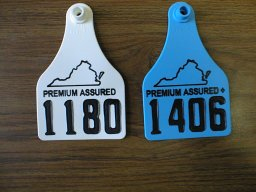Virginia Premium Assured Heifer Program (VPAHP)
The VPAHP exists to provide a template for the proper development and management of beef females. Heifers are certified for health, reproductive and physical soundness, along with genetics.
Virginia Premium Assured Heifers must meet specific health, reproductive, physical and genetic requirements. All requirements are certified by a third party. Few other heifer development programs have as extensive and rigorous requirements as the Virginia Premium Assured Heifer Program. The requirements focus on the important traits that make quality replacement heifers.
There are two levels to the program - Virginia Premium Assured and Virginia Premium Assured Plus. Heifers can either be bred or open. The Premium Assured level health and reproductive requirements are similar to the Kentucky Elite and Missouri Show-Me Select heifer programs, but service sires for Virginia Premium Assured Heifers must meet additional calving ease and growth EPD requirements. The Premium Assured Plus level includes requirements on the genetic merit (EPD's) of the sire of the heifer.
- Physical condition defined age, limited range in frame size, correct structure, adequate body condition and proper weight.
- Reproductive soundness restricted age at conception (bred heifers) or minimum reproductive tract score (open heifers) and minimum pelvic area (open heifers).
- Health vaccinated for major respiratory diseases, clostridial diseases (blackleg), brucellosis and lepto. and treated for parasites, no physical defects or horns.
- Calf Genetics (bred heifers only) service sire has low birth weight EPD and meets VQA minimums for growth.
- Meet all requirements of the Premium Assured level.
- Heifer Genetics - heifers must be sired by bulls that meet minimum requirements for growth and milk.
Virginia Premium Assured Heifers are raised on the home farm or by private contractors. Extension specialists and agents work with producers and veterinarians to design a management program to meet the goals of the Virginia Premium Assured Heifers Program. This includes assistance with nutrition, reproductive management, breeding and health programs.
Producers submit documentation on Health Practices, Pre-breeding Examination and Pregnancy Examination. The producer, the veterinarian and the extension agent fill out these documents. Documents are submitted to regional VAPAH coordinators. Heifers physical condition is evaluated by the local Virginia Premium Assured Heifer Committee consisting of at least 2 producers and the local animal science extension agent.
Virginia Premium Assured Heifers Health Certification and Processing Map
Bred heifers are assured to be bred to calving ease bulls with better than average growth potential. Open heifers are reproductively mature and have a high probability of conceiving during the breeding season. The Premium Assured Plus level of the program assures the genetic background of the heifer as well.
Any bred heifer diagnosed as open within 30 days of purchase will be replaced or purchase price refunded by the breeder of the heifer. Arrangements for return of non-pregnant heifer to the breeder or sale of that heifer need to be made between buyer and the breeder.
The birth weight EPD requirements for service sires and pelvic area minimums for heifers are designed to reduce or minimize calving problems. A recent survey of Virginia PAH buyers indicates the calving assistance rate averages about 10 to 12% for Premium Assured Heifers compared to a national average of 20 to 25 % assisted births. Since the percentage of heifers needing assistance varies widely from farm to farm based on nutrition and management after purchase, buyers should be aware that Virginia PAH are not guaranteed to be free of calving problems.
The minimum body weight requirements and reproductive tract scores are designed to assure that heifers are reproductively mature at the time of sale. This does not guarantee that 100% of the heifers will get pregnant. Factors like nutrition after purchase, bull fertility and ability to carry calves to term cannot be predicted by these standards. Therefore, buyers should understand that there is still some risk that a few open heifers purchased may not breed or carry calves to term. However, the Virginia PAH program is designed to minimize this risk.
All Virginia Premium Assured Bred Heifers are pregnant to sires that are calving ease as indicated by birth weight EPDs and have above average EPDs for growth. This requirement is designed to produce calves that are light at birth but grow rapidly. Premium Assured Plus heifers were sired by bulls that were above average for growth and met minimum standards for milk. These Plus heifers provide the added genetic advantage of additional growth and milk production.
Heifers meeting the Virginia PAH requirements are eligible to sell as Virginia Premium Assured or Virginia Premium Assured Plus. Second owner cattle must be source verified and in possession by 10 months of age. Virginia Premium Assured Heifers may be sold by any group or individual provided all requirements are met and verified. In addition, extension specialists help groups of producers work with sales management professionals such as livestock markets, breed associations and the Virginia Cattlemen's Association to market their heifers.
Even though Virginia PAH sales are facilitated by livestock markets, Virginia Cooperative Extension and Virginia Department of Agriculture, all sales are contractual arrangements between the buyer and seller of the heifer and are equally binding on both. Neither Virginia Cooperative Extension, the Sale Manager, VDACS, nor any other person connected with the management of Virginia PAH sales, assumes any liability, legal or otherwise.
Individuals or groups interested in participating in the Virginia Premium Assured Heifers program or wanting more specific information should contact Dr. Scott Greiner, Extension Beef Cattle Specialist, at (540) 231-9159.




